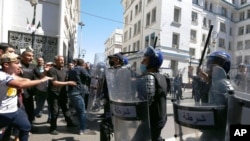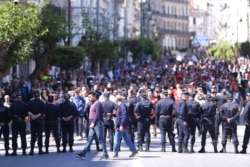U.N. human rights officials are expressing concern about increasingly repressive actions by the Algerian government, which they say are stifling peoples' rights to freedom of opinion and assembly.
Demonstrations have not been held in the streets of Algeria for most of the past year because of COVID-19. However, since they resumed February 13, the U.N. human rights office says it has received reports of security forces using unnecessary and disproportionate force against peaceful protesters.
The protesters are part of the Hirak movement, which began two years ago after then-president Abdelaziz Bouteflika announced he would run for a fifth term. While he is no longer in power, the movement continues to call for the ouster of the ruling elite, which it considers corrupt.
Human rights spokesman Rupert Colville said student marches were blocked on four occasions in April and May, and security forces have arrested hundreds of protesters.
He noted some detainees reportedly were released after being forced to sign a document promising not to participate in protests.
"Currently, around 70 people are still reportedly detained for exercising their legitimate human rights," Colville said. "Some of them are serving lengthy sentences, while others are in pre-trial detention. New allegations of physical and sexual violence in detention have also been surfacing in recent days."
Colville said activists, human rights defenders, journalists, and ordinary citizens peacefully expressing dissent continue to face criminal prosecution. He added that Hirak activists continue to be prosecuted even after a presidential pardon was announced in February.
"So, we urge the Algerian authorities to stop using violence to disperse peaceful demonstrations, to halt arbitrary arrests and detention of individuals for exercising their fundamental rights to freedom of opinion, expression and peaceful assembly … and to cease all forms of harassment and intimidation against them," he said.
The U.N. human rights office is calling on Algerian authorities to conduct prompt, impartial and effective investigations into all allegations of human rights violations, to hold perpetrators accountable, and to provide redress for the victims.
In response to past criticisms, government spokesman and Minister of Communication Ammar Belhimer has said people who are arrested "are not detained by the judiciary for expressing their opinion, but for reasons relating to maintaining public security."





